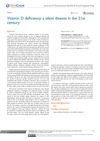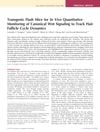 January 2006 in “Elsevier eBooks”
January 2006 in “Elsevier eBooks” Cats with Feline Symmetrical Alopecia can regrow hair with proper treatment based on the specific cause, including diet, medication, or stress management.
 April 2017 in “Journal of nutritional health & food engineering”
April 2017 in “Journal of nutritional health & food engineering” Over 65% of people in the United Arab Emirates have undetected vitamin D deficiency, causing symptoms often mistaken for stress or migraines.
 32 citations,
December 2017 in “International Journal of Molecular Sciences”
32 citations,
December 2017 in “International Journal of Molecular Sciences” Low vitamin D might be linked to certain types of hair loss, and supplements could help, but more research is needed.
43 citations,
July 2017 in “International journal of pharmaceutics” Using β-cyclodextrin derivatives improves the solubility and bioavailability of steroidal drugs.
15 citations,
March 2022 in “Acta Biomaterialia” The new 3D bioprinting method successfully regenerated hair follicles and shows promise for treating hair loss.
20 citations,
August 2010 in “The Journal of Urology” Ezetimibe effectively reduces prostate size in cases of benign prostatic hyperplasia.
 August 2001 in “Veterinary Dermatology”
August 2001 in “Veterinary Dermatology” The meeting presented findings on effective treatments for various pet skin conditions and insights into the immune responses of dogs with atopic dermatitis.
 3 citations,
April 2010 in “Journal of Receptors and Signal Transduction”
3 citations,
April 2010 in “Journal of Receptors and Signal Transduction” Minoxidil, a common alopecia medication, might cause eye changes due to its properties and lack of tissue selectivity.
 173 citations,
January 2014 in “Nature Cell Biology”
173 citations,
January 2014 in “Nature Cell Biology” Wnt signaling controls whether hair follicle stem cells stay inactive or regenerate hair.
 130 citations,
November 2017 in “Frontiers in Immunology”
130 citations,
November 2017 in “Frontiers in Immunology” The conclusion is that Treg-targeted therapies have potential, but more knowledge of Treg biology is needed for effective treatments, including for cancer.
 August 2023 in “Clinical, Cosmetic and Investigational Dermatology”
August 2023 in “Clinical, Cosmetic and Investigational Dermatology” Research on the human skin microbiome has grown, focusing on skin health and diseases, with more studies needed on antibiotic resistance and AI applications.
 18 citations,
April 2013 in “Inflammatory Bowel Diseases”
18 citations,
April 2013 in “Inflammatory Bowel Diseases” People with Inflammatory Bowel Disease often lose hair due to stress, medication side effects, or lack of nutrients, and treatment depends on the specific cause.
 7 citations,
May 2020 in “Trends in molecular medicine”
7 citations,
May 2020 in “Trends in molecular medicine” The document concludes that the immune-inhibitory environment of the hair follicle may prevent melanoma development.
 16 citations,
February 2014 in “Journal of Investigative Dermatology”
16 citations,
February 2014 in “Journal of Investigative Dermatology” Researchers developed a mouse model that tracks hair growth using bioluminescence, improving accuracy in studying hair cycles.
 September 2022 in “Polish Hyperbaric Research”
September 2022 in “Polish Hyperbaric Research” Some treatments for hair loss, like finasteride, biotin, and minoxidil, can be effective, but their success varies by individual case.
 33 citations,
September 2017 in “Molecules”
33 citations,
September 2017 in “Molecules” Red ginseng oil and its components help promote hair regrowth and could treat hair loss.
 27 citations,
September 1992 in “The Lancet”
27 citations,
September 1992 in “The Lancet” ICL is a condition with low CD4+ T cells like AIDS but not caused by HIV, and normal CD4+ T cell counts may vary between men and women.

Baricitinib is a new, effective treatment for advanced alopecia areata but is costly and has risks.
 18 citations,
November 1981 in “JAMA”
18 citations,
November 1981 in “JAMA” The Beverly Hills Diet is unscientific, potentially harmful, and could cause serious health issues.
 January 2023 in “Biocell”
January 2023 in “Biocell” Safflower extract helps protect hair follicle cells from damage caused by chemotherapy.
 January 2012 in “Else Kröner-Fresenius Symposia”
January 2012 in “Else Kröner-Fresenius Symposia” Maintaining DNA integrity in stem cells is crucial to prevent aging and cancer.
 51 citations,
October 2002 in “British Journal of Dermatology”
51 citations,
October 2002 in “British Journal of Dermatology” Finasteride increases hair density in female androgenetic alopecia, but individual results may vary.
 126 citations,
January 2001 in “World Journal of Surgery”
126 citations,
January 2001 in “World Journal of Surgery” Surgery is the main treatment for liver hydatidosis, but has risks; albendazole is the most effective drug but can have side effects.
 86 citations,
January 2019 in “Frontiers in Immunology”
86 citations,
January 2019 in “Frontiers in Immunology” The document concludes that diagnosing and treating Human African Trypanosomiasis is challenging, but new treatments like fexinidazole are promising.
 57 citations,
February 2018 in “Journal of the American Academy of Dermatology”
57 citations,
February 2018 in “Journal of the American Academy of Dermatology” Biotin supplements are not proven to improve hair or nails and may interfere with medical tests.
 4 citations,
October 2022 in “Genes”
4 citations,
October 2022 in “Genes” Our microbiome may affect the development of the hair loss condition Alopecia Areata, but more research is needed to understand this relationship.

The conclusion is that endocrinology significantly impacts medicine with various common medications used for treatment.
 129 citations,
May 2015 in “Cell Stem Cell”
129 citations,
May 2015 in “Cell Stem Cell” Different types of stem cells exist within individual skin layers, and they can adapt to damage, transplantation, or tumor growth. These cells are regulated by their environment and genetic factors. Tumor growth is driven by expanding, genetically altered cells, not long-lived mutant stem cells. There's evidence of cancer stem cells in skin tumors. Other cells, bacteria, and genetic factors help maintain balance and contribute to disease progression. A method for growing mini organs from single cells has been developed.
 4 citations,
June 2019 in “Journal of Cosmetic Dermatology”
4 citations,
June 2019 in “Journal of Cosmetic Dermatology” Women with hirsutism have different levels of omentin-1, which may be linked to the condition and its genetic aspects.
 5 citations,
August 2019 in “iScience”
5 citations,
August 2019 in “iScience” Deleting the Trf1 protein in mice is safe and may help prevent cancer without major side effects.



























